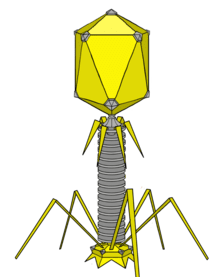Adenoviruses are found in the viral family known as Adenoviridae. They are non-enveloped viruses with an icosahedral nucleocapsid. Adenoviruses are DNA viruses; and they possess a double stranded DNA molecule.
Adenoviruses are a group of viruses that typically cause respiratory illnesses, such as a common cold, conjunctivitis, croup, bronchitis, or pneumonia. In children, adenoviruses usually cause infections in the respiratory tract and intestinal tract.
Adenovirus can survive for a long time outside the body and water because they are usually unstable to chemical and physical agents as well as adverse pH condition.
SYMPTOMS OF ADENOVIRUS INFECTION
Adenoviruses can cause a wide range of illnesses such as:
- Common cold
- Sore throat
- Bronchitis (a condition that occurs when the airways in the lungs become filled with mucus and may spasm, which causes a person to cough and have shortness of breath)
- Pneumonia (infection of the lungs)
- Diarrhea
- Pink eye (conjunctivitis)
- Fever
- Bladder inflammation or infection
- Inflammation of stomach and intestines
- Neurologic disease (conditions that affect the brain and spinal cord)
Adenoviruses can also cause mild to severe illness, though serious illness is less common. People with weakened immune systems, or existing respiratory or cardiac disease, are at higher risk of developing severe illness from an adenovirus infection.
TRANSMISSION OF ADENOVIRUS INFECTION
Adenoviruses are usually spread from an infected person to others through:
- close personal contact, such as touching or shaking hands
- the air by coughing and sneezing
- touching an object or surface with adenoviruses on it, then touching your mouth, nose, or eyes before washing your hands
- adenoviruses are majorly spread via respiratory droplets
- they can also be spread via the feacal oral route
Some adenoviruses can spread through an infected person’s stool, for example, during diaper changing. Adenovirus can also spread through the water, such as swimming pools, but this is less common.
Sometimes the virus can be shed (released from the body) for a long time after a person recovers from an adenovirus infection, especially among people who have weakened immune systems. This “virus shedding” usually occurs without any symptoms, even though the person can still spread adenovirus to other people.
OUTBREAKS CAUSED BY ADENOVIRUS INFECTION
Outbreaks of adenovirus infection can occur throughout the year. They are usually associated with respiratory illnesses or conjunctivitis.
Reported sporadic cases and outbreaks of adenovirus have included:
- Adenovirus types 3, 4 and 7, which are most commonly associated with acute respiratory disease
- Adenovirus type 14, which since 2007 has been associated with outbreaks of acute respiratory illness among U.S. military recruits and the general public
- Adenovirus types 8, 19, 37, 53, and 54, which can cause epidemic keratoconjunctivitis
- Enteric adenovirus types 40 and 41, which cause gastroenteritis, usually in children
- Some adenoviruses (e.g., 4 and 7) that spread in bodies of water such as small lakes or swimming pools without adequate chlorine and can cause outbreaks of febrile disease with conjunctivitis
Health Professionals should:
- Consider adenoviruses as possible causes of upper respiratory illness, and lower respiratory illness such as pneumonia
- Report unusual clusters of illness (e.g., respiratory, conjunctivitis) potentially caused by adenoviruses to the state or local health department
PREVENTION OF INFECTION CAUSED BY ADENOVIRUS
There is currently no adenovirus vaccine available to the general public. However, adenovirus vaccine is available for U.S. military only.A vaccine specific for adenovirus types 4 and 7 was approved by the U.S. Food and Drug Administration (FDA) in March 2011, for use only in U.S. military personnel who may be at higher risk for infection from these two adenovirus types.
Follow simple steps to protect yourself and others:
You can protect yourself and others from adenoviruses and other respiratory illnesses by following a few simple steps:
- Wash your hands often with soap and water
- Avoid touching your eyes, nose, or mouth with unwashed hands
- Avoid close contact with people who are sick
If you’re sick you can help protect others:
- Stay home when you are sick
- Cover your mouth and nose when coughing or sneezing
- Avoid sharing cups and eating utensils with others
- Refrain from kissing others
- Wash your hands often with soap and water, especially after using the bathroom
Frequent hand washing is especially important in childcare settings and healthcare facilities.
Maintain proper chlorine levels to prevent outbreaks
Adenoviruses are resistant to many common disinfectant products and can remain infectious for long periods on surfaces and objects. It is important to keep adequate levels of chlorine in swimming pools to prevent outbreaks of conjunctivitis caused by adenoviruses.
TREATMENT OF ADENOVIRUS INFECTION
There is no specific treatment for people with adenovirus infection. Most adenovirus infections are mild and may require only care to help relieve symptoms. Adenovirus infection is usually benign in nature, and is usually self-limiting in nature.
Good hygiene, including proper hand washing using disinfectants or detergents, is still the best way to avoid picking up the adenovirus from an infected person.
Other methods of preventing and controlling the spread of adenovirus infection in human population include: covering your mouth while coughing and sneezing, avoiding shared cups and utensils, and even refraining from kissing as vigilant precautionary measures against the stubborn adenovirus, for which there is no known cure.
SOURCE:
Center for Disease Control and Prevention (CDC)
Discover more from #1 Microbiology Resource Hub
Subscribe to get the latest posts to your email.



